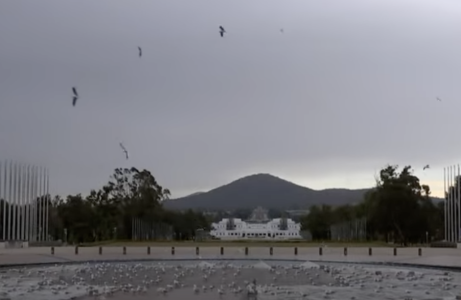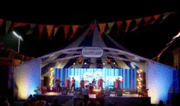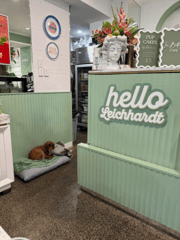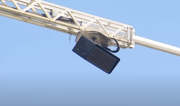‘They’re everywhere’: An unexpected swarm terrorises Parliament staff and visitors
- Replies 0
If you thought the most raucous debates at Parliament House happened inside the chambers, think again!
This spring, it’s not just the politicians making noise in Canberra—hundreds of cheeky animals have descended on the forecourt, and they’re making their presence known in a big way.
As the weather warms up and breeding season kicks into gear, the forecourt of Parliament House has become a hotspot for these opportunistic seagulls.
Their numbers have boomed over the last week, turning the area into a lively (and messy) battleground between staff, visitors, and the birds.
Daniel Gair, Acting Director for Maintenance Services at Parliament, says the situation is getting out of hand: ‘They create a lot of noise, a lot of mess, and eventually they start harassing people for food. If the seagull thinks you’re carrying something that looks like it might be food, they’ll give you a hard time to check it out.’
He adds: ‘We have got to act on that pretty early.’

It turns out, the birds aren’t just there for the sausage rolls and chips.
The island in the middle of the forecourt’s water feature is a prime piece of real estate for nesting.
Surrounded by water, it offers safety from predators like foxes and other land-based animals—a must for silver gulls during breeding season.
Chris Davey from Canberra Birds, a local ornithologist group, explains: ‘Silver gulls are very prone to predation by foxes and other land-based animals, and that is why they breed on islands. Where they breed, they must be surrounded by water.’ He also notes: ‘This is really what goes on with a lot of birds at this time of year, there is a lot of social behaviour going on where they are forming their pairs.’
Of course, with so many birds comes a not-so-pleasant side effect: droppings. Each morning, a dedicated team of cleaners is out with the pressure washers, scrubbing away the evidence of the previous night’s avian party.
And as Gair points out: ‘As the seagull numbers increase, we also have to treat the water more, so we are adding more chlorine into the water.’
To discourage the gulls from nesting, landscapers have covered the grevilleas on the island with grow cloths.
This trick has worked in the past, making the area less appealing for nesting while also keeping the plants warm.
The cloths will stay in place for the next month, and the hope is that the gulls will move on to more suitable breeding grounds soon.
But while the cloths are keeping nests at bay, the birds are still making themselves at home after dark, using the forecourt as a safe resting spot.
Where will the gulls go next?
It’s a bit of a mystery. Chris Davey is keeping a close eye on Spinnaker Island in Lake Burley Griffin, a usual hotspot for breeding pairs, but so far, the birds haven’t shown up there. ‘They should be sitting on eggs by now,’ he says, adding to the intrigue.
Source: ABC News (Australia) / Youtube.
And if you thought seagulls were just a coastal nuisance, think again! Silver gulls are found all over Australia, breeding wherever they find suitable conditions—not just by the sea.
‘This is why we insist on calling them silver gulls, not seagulls,’ Davey points out.
Read more: ‘This is actually breaking my heart’: Rescuers share heart-wrenching details of a wildlife tragedy

We’d love to hear your stories! Have you ever been harassed by a seagull (or silver gull) while enjoying a snack outdoors? Do you have any tips for keeping your lunch safe from these feathered thieves? Share your experiences and advice in the comments below!
This spring, it’s not just the politicians making noise in Canberra—hundreds of cheeky animals have descended on the forecourt, and they’re making their presence known in a big way.
As the weather warms up and breeding season kicks into gear, the forecourt of Parliament House has become a hotspot for these opportunistic seagulls.
Their numbers have boomed over the last week, turning the area into a lively (and messy) battleground between staff, visitors, and the birds.
Daniel Gair, Acting Director for Maintenance Services at Parliament, says the situation is getting out of hand: ‘They create a lot of noise, a lot of mess, and eventually they start harassing people for food. If the seagull thinks you’re carrying something that looks like it might be food, they’ll give you a hard time to check it out.’
He adds: ‘We have got to act on that pretty early.’

Silver gulls (often called seagulls) have been swarming the forecourt of Parliament House in Canberra in large numbers, making noise and harassing staff and visitors as the weather warms up. Image source: ABC News (Australia) / Youtube.
It turns out, the birds aren’t just there for the sausage rolls and chips.
The island in the middle of the forecourt’s water feature is a prime piece of real estate for nesting.
Surrounded by water, it offers safety from predators like foxes and other land-based animals—a must for silver gulls during breeding season.
Chris Davey from Canberra Birds, a local ornithologist group, explains: ‘Silver gulls are very prone to predation by foxes and other land-based animals, and that is why they breed on islands. Where they breed, they must be surrounded by water.’ He also notes: ‘This is really what goes on with a lot of birds at this time of year, there is a lot of social behaviour going on where they are forming their pairs.’
Of course, with so many birds comes a not-so-pleasant side effect: droppings. Each morning, a dedicated team of cleaners is out with the pressure washers, scrubbing away the evidence of the previous night’s avian party.
And as Gair points out: ‘As the seagull numbers increase, we also have to treat the water more, so we are adding more chlorine into the water.’
To discourage the gulls from nesting, landscapers have covered the grevilleas on the island with grow cloths.
This trick has worked in the past, making the area less appealing for nesting while also keeping the plants warm.
The cloths will stay in place for the next month, and the hope is that the gulls will move on to more suitable breeding grounds soon.
But while the cloths are keeping nests at bay, the birds are still making themselves at home after dark, using the forecourt as a safe resting spot.
Where will the gulls go next?
It’s a bit of a mystery. Chris Davey is keeping a close eye on Spinnaker Island in Lake Burley Griffin, a usual hotspot for breeding pairs, but so far, the birds haven’t shown up there. ‘They should be sitting on eggs by now,’ he says, adding to the intrigue.
Source: ABC News (Australia) / Youtube.
And if you thought seagulls were just a coastal nuisance, think again! Silver gulls are found all over Australia, breeding wherever they find suitable conditions—not just by the sea.
‘This is why we insist on calling them silver gulls, not seagulls,’ Davey points out.
Read more: ‘This is actually breaking my heart’: Rescuers share heart-wrenching details of a wildlife tragedy
Key Takeaways
- Silver gulls (often called seagulls) have been swarming the forecourt of Parliament House in Canberra in large numbers, making noise and harassing staff and visitors as the weather warms up.
- Parliament House staff are using grow cloths to cover plants on the island in the forecourt water feature to deter gulls from nesting there, a method which has worked in the past.
- Cleaning up after the gulls is now a daily task, with teams pressure-washing droppings and treating the water with extra chlorine to manage the mess and hygiene.
- Ornithologists explain that silver gulls will nest anywhere surrounded by water to avoid predators, and they are just as likely to breed inland as on the coast, despite popular belief.
We’d love to hear your stories! Have you ever been harassed by a seagull (or silver gull) while enjoying a snack outdoors? Do you have any tips for keeping your lunch safe from these feathered thieves? Share your experiences and advice in the comments below!







